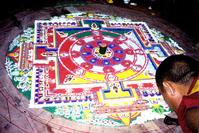The Buddhist Wedding Ceremony
Buddhist wedding ceremonies are becoming increasingly
popular in the west, and are not just restricted to those who follow the faith.

Whereas in many religions (both Asian
and western), marriage is a sacrament and an essential aspect of religious duty,
marriage in Buddhism is purely a secular affair. A Buddhist's decision to wed is
not affected by or intertwined with a desire to continue the Buddhist faith.
Marriage is considered a personal concern; there are no religious directions on
whether or not one should marry or remain unwed. There is also no formal wedding
service. This does not, however, mean that Buddhist weddings do not have a rich
tradition. Throughout the subcontinent, Buddhist communities have assembled
creative wedding ceremonies out of Asian and Buddhist rituals.
Pre-Wedding Rituals
In the cultural pervasion of religion that all Asia has experienced, many Buddhist
weddings are arranged. A wedding broker is normally responsible for the match
between bride and groom. He or she will visit families of the area assessing their
wealth, health, social status and prospects. When visiting families, the wedding broker
can easily suggest a match for their child, having mentally catalogued the available people
of the area.
A family will likely take the marriage broker's advice and pay a
preliminary visit to the family of the person suggested. The parents of the two
families will meet without the children to assess each other's prospect,
checking the informational intelligence of the marriage broker. After several
more visits, including one with an astrologer, the couple to be wed will meet
and hopefully give the final okay to the wedding.
After having agreed
upon a dowry amount, the astrologer will decide on a mutually auspicious date
for the couple to wed. During the pre-wedding days, the couple may choose to
receive monks in their new home. The monks will bless the house with holy water
and recite verses from the Tipitaka (Buddhist holy book). As the monks complete
their blessing, the groom's family will offer them alms (gifts) to bring good
luck to the marriage.
The Wedding Ceremony
The wedding day is
begun at a local temple where the couple separately asks for the blessings of
Buddha. Both bride and groom are then dressed in outfits traditional to their
region.
At the mutually auspicious astrologically designated wedding
time, the bride and groom are individually taken to the shrine room of their
local temple or a hall hired for the occasion. Here, the couple sees each other
for the first time on that day.
Spiritual Buddhist wedding traditions
don't necessarily require the presence of monks or the use of a temple's shrine
room. For these traditions, the wedding location would be equipped with a shrine
to Buddha featuring candles, flowers, incense and a statue or image of
Buddha.
The ceremony begins as the entire assembly recites the Vandana,
Tisarana and Pancasila readings. The couple then lights the candles and incense
sticks surrounding Buddha's image and offers him the flowers within the shrine.
Because of the secularity of Buddhist weddings, there is no assigned set of
marriage vows. However, the bride and groom will recite their expected
undertakings using the Sigilovdda Sutta as a guide. The Sigiloydda Sutta
says:
"In five ways should a wife, as Western quarter, be ministered to
by her husband: by respect, by courtesy, by faithfulness, by handing over
authority to her, by providing her with ornaments. In these five ways does the
wife minister to by her husband as the Western quarter, love him: her duties are
well-performed by hospitality to kin of both, by faithfulness, by watching over
the goods he brings and by skill and industry in discharging all business."
After these vows are spoken, the bride and groom can exchange rings. If
monks are present, the marriage vows will be both preceded and proceeded by
their chanting.
After the Wedding
Once officially married, the
couple receives their guests with the huge feast and decorations prepared in the
previous days to the wedding.
|


